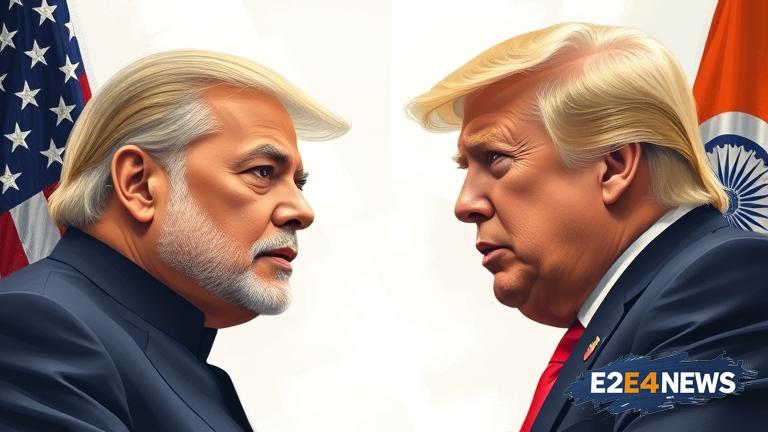The United States and India are on the brink of a trade war, as President Donald Trump announced that he is likely to impose higher tariffs on Indian goods within the next 24 hours. This move is expected to escalate the ongoing trade tensions between the two nations. The US has been seeking greater access to the Indian market, particularly in the agricultural and dairy sectors. However, India has been resistant to these demands, citing concerns over the impact on its domestic industries. The proposed tariff hike is seen as a retaliatory measure by the US, aimed at pressuring India into making concessions. The Indian government has already imposed tariffs on several US goods, including almonds and apples, in response to the US’s decision to withdraw India’s preferential trade status. The trade tensions between the US and India have been simmering for several months, with both sides engaging in a war of words. The US has accused India of unfair trade practices, including high tariffs and subsidies to domestic industries. India, on the other hand, has accused the US of protectionism and seeking to undermine its economic development. The proposed tariff hike is expected to have a significant impact on Indian exporters, who rely heavily on the US market. The Indian government has already begun to take steps to mitigate the impact of the tariffs, including seeking alternative markets for its exports. However, the tariffs are expected to have a negative impact on the Indian economy, particularly in the short term. The trade tensions between the US and India are also expected to have a broader impact on the global economy, particularly in the context of the ongoing trade war between the US and China. The US has been seeking to reduce its trade deficit with India, which stood at $25.2 billion in 2019. The proposed tariff hike is seen as a measure to achieve this goal, although it is likely to have unintended consequences. The Indian government has already announced plans to impose retaliatory tariffs on US goods, which could further escalate the trade tensions. The trade war between the US and India is also expected to have a negative impact on the global trade landscape, particularly in the context of the World Trade Organization (WTO). The WTO has been seeking to promote free trade and reduce trade barriers, although the ongoing trade tensions between the US and India are likely to undermine these efforts. The proposed tariff hike is also expected to have a negative impact on the US economy, particularly in the context of the ongoing trade war with China. The US has been seeking to reduce its trade deficit with China, although the proposed tariff hike on Indian goods could further complicate these efforts. The trade tensions between the US and India are also expected to have a broader impact on the global economy, particularly in the context of the ongoing trade war between the US and China. The US has been seeking to promote its economic interests, although the proposed tariff hike on Indian goods could have unintended consequences. The Indian government has already announced plans to seek alternative markets for its exports, including the European Union and the Association of Southeast Asian Nations (ASEAN). The proposed tariff hike is expected to have a significant impact on the Indian economy, particularly in the short term. The trade tensions between the US and India are also expected to have a negative impact on the global trade landscape, particularly in the context of the WTO.
